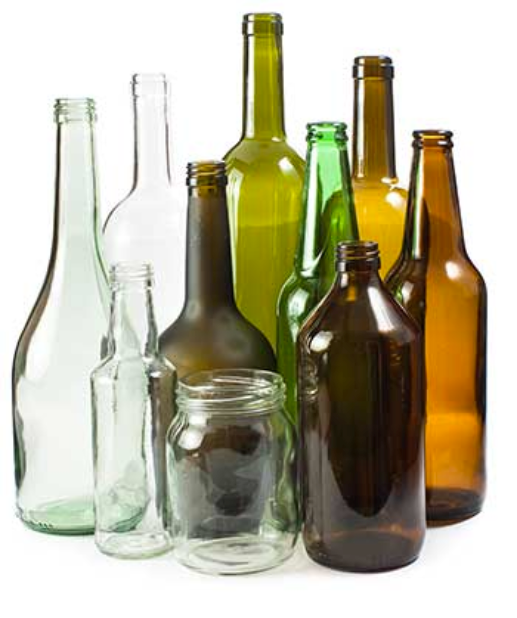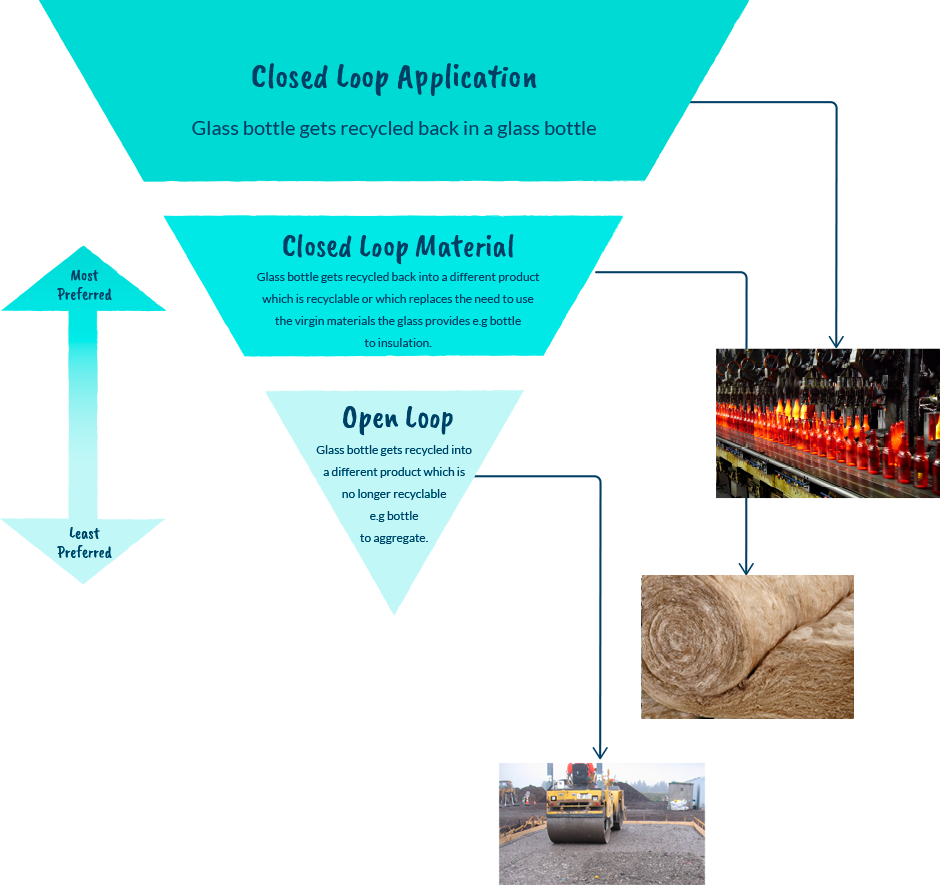
Infinitely Recyclable
The Glass StoryGlass has been a part of human history since stone age people used naturally occurring obsidian (black volcanic glass) for decoration and jewellery.
These days glass is a common object in everything from windows to containers, jewellery to insulation. The level to which those products can be recycled or reused varies considerably in New Zealand depending on their type.
Recycling Glass
The concept of recycling glass dates back to the Egyptians and Romans, who realised the benefits of using old glass to make new glass. Today, returning glass to the furnace to make new glass is still accepted as the best outcome as glass does not break down in landfill.
The Glass Packaging Forum is focused on the recovery of glass containers and jars from across New Zealand, and in particularly returning it to the furnace to complete a ‘full circle’.
Circular Resource
Glass is a perfect example of a circular resource which supports the growth of a Circular Economy in New Zealand.
A circular economy aims to move away from a traditional linear ‘take-make-waste’ model. Instead, the lifecycle of products is maximised and at the end of life of a product all materials are fully reutilised. Glass is 100% recyclable and infinitely recyclable – a fully circular resource.
Glass also has a positive contribution to New Zealand’s efforts to limit climate change due to production benefits from using recycled glass (known as cullet).
Preserving Resources
Using cullet to make new glass reduces the volume of virgin materials such as silica sand and soda ash required in the production process. And, as the Romans discovered, cullet can be melted at a lower temperature than virgin materials and so requires less energy. This in turn means lower carbon emissions.
The combination of the challenging logistics in our long, narrow country and other cost and quality considerations means it’s not always possible to recycle all recovered glass. Fortunately, glass can also be used in a number of other applications, like sports turf and golf bunkers, base course for roading and decorative paving stones. These are good secondary outcomes for glass and preferable to sending glass to landfill which is a waste of useful material.
Did you know?

FAQs
What sort of glass can be recycled?
In New Zealand, using kerbside or public place recycling, you can recycle food and beverage containers, including:
- clear glass jars and bottles
- brown glass (beer bottles)
- green glass (wine bottles) – this includes blue glass
If sorted into their different colours, the above types of glass can be recycled into new bottles and jars without loss of purity.
What sort of glass cannot be recycled?
You can’t recycle light bulbs and fluorescent tubes, pyrex dishes and ovenware, china and crockery – cups, saucers, plates, decorated drinking glasses, window glass, opal glass, glass bricks, medical and laboratory glass containers, TV tubes and computer screens.
These different types of glass have various additives, materials or coatings which contaminate the production of new glass containers and jars.
Why do containers and jars need to be separated by colour before they can be recycled?
Visy Glass, New Zealand’s only glass manufacturer, makes bottles and jars in seven colours – flint or clear, amber, blue and four varieties of green.
Colour separation means they can use high volumes of cullet in the manufacturing process and still maintain the green, brown and clear coloured containers which their customers require. Colour separation also ensures that the glass furnaces can be run as energy efficiently as possible.
What are the alternative uses for glass?
In New Zealand, there are the following alternatives (used to varying degrees):
- Sporting turf & golf bunkers
- Base course for roading
- Water filtration
- Agricultural mulch
- Concrete foundation
- Decorative paving stones and kitchen worktops
- Decorative medium in the creation of gardens
In some areas of New Zealand glass bottles and jars go into the recycling system alongside paper, plastics and cans. Does this mean that glass can’t be used to make new glass containers?
If glass is mixed (co-mingled) alongside cans, paper and plastics, and not separated by colour in the collection truck, it must be separated at the sorting plant before it can be made into new glass containers.
If it is not going to be made into new glass containers, colour separation is not as important but it still needs to be separated from other packaging.
Co-mingled glass that is sorted mechanically is not as effective as that sorted by hand and reduces the amount of glass which can be recycled into new glass containers.
Some councils have elected to keep their glass separate at the point of collection. This results in better quality cullet (glass) for recycling.
What happens to bottle tops and paper labels?
If possible, bottle tops, ring tabs and neck rings should be remove before glass goes in the recycling bin. Metal contaminates the glass recycling process. Paper is also a contaminant in the glass recycling process. Paper sleeves and labels are removed from the bottles and jars when they are received at the sorting plant. Any small amount of paper left is burnt up in the furnace.
Where can I recycle my glass?
You can recycle at kerbside (outside your house) or at a bottle collection point. If in doubt, check with your local council to find your nearest recycling facilities.
Who organises the recycling trucks?
Your local council is responsible for residential waste management and will select a company or companies to collect your household recycling and to process it. If you have any questions about this part of the recycling process, please contact your council. If you are a business you are responsible for contracting your own recycling and waste management provider. Your council should be able to provide a list of providers. Options vary widely across New Zealand.
Are some outcomes for glass better than others?
Yes, like many products at the end of their life, some outcomes are preferred over others. This is mainly due to the efficient use of resources and the likelihood of the product continuing to be a circular resource, that is one that can be recycled or reused over and over again.



